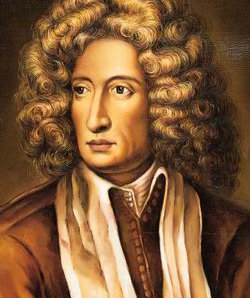
Arcangelo Corelli
Born in Fusignano, Italy, in 1653, he studied in Bologna, a distinguished musical center, then established himself in Rome in the 1670s. By 1679 had entered the service of Queen Christina of Sweden. Thanks to his musical achievements and growing international reputation he found no trouble in obtaining the support of a succession of influential patrons. History has remembered him with such titles as "Founder of Modern Violin Technique," the "World's First Great Violinist," and the "Father of the Concerto Grosso." His contributions can be divided three ways, as violinist, composer, and teacher. It was his skill on the new instrument known as the violin and his extensive and very popular concert tours throughout Europe which did most to give that instrument its prominent place in music. It is probably correct to say that Corelli's popularity as a violinist was as great in his time as was Paganini's during the 19th century. Corelli's popularity as a violinist was equaled by his acclaim as a composer. His music was performed and honored throughout all Europe; in fact, his was the most popular instrumental music. Although Corelli was not the inventor of the Concerto Grosso principle, it was he who proved the potentialities of the form, popularized it, and wrote the first great music for it. Corelli's achievements as a teacher were again outstanding. Among his many students were included not only Geminiani but the famed Antonio Vivaldi. Corelli occupied a leading position in the musical life of Rome for some thirty years, performing as a violinist and directing performances often on occasions of the greatest public importance. His style of composition was much imitated and provided a model, both through a wide dissemination of works published in his lifetime and through the performance of these works in Rome. He died on January 19, 1713, at Rome in the 59th year of his life.